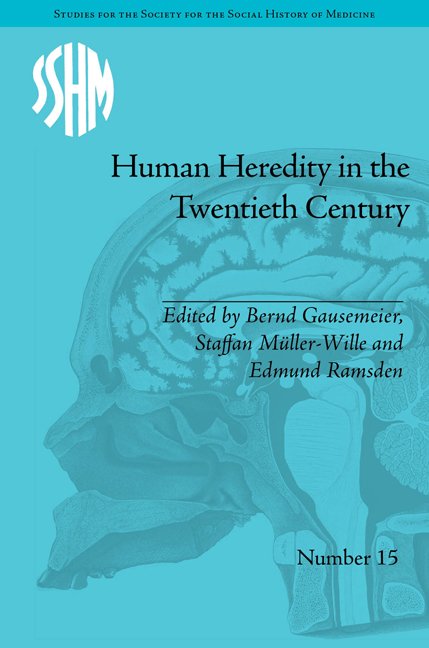Book contents
- Frontmatter
- Contents
- Acknowledgements
- List of Contributors
- List of Figures and Tables
- Introduction: Human Heredity in the Twentieth Century
- Part I Constructing Surveys of Heredity
- Part II Blood and Populations
- Part III Human Heredity in the Laboratory
- Part IV Understanding and Managing Disease
- 11 The Disappearance of the Concept of Anticipation in the Post-War World
- 12 ‘The Most Hereditary of All Diseases’: Haemophilia and the Utility of Genetics for Haematology, 1930–70
- 13 How PKU Became a Genetic Disease
- Part V Reconstructing Discipline(s)
- Notes
- Index
11 - The Disappearance of the Concept of Anticipation in the Post-War World
from Part IV - Understanding and Managing Disease
- Frontmatter
- Contents
- Acknowledgements
- List of Contributors
- List of Figures and Tables
- Introduction: Human Heredity in the Twentieth Century
- Part I Constructing Surveys of Heredity
- Part II Blood and Populations
- Part III Human Heredity in the Laboratory
- Part IV Understanding and Managing Disease
- 11 The Disappearance of the Concept of Anticipation in the Post-War World
- 12 ‘The Most Hereditary of All Diseases’: Haemophilia and the Utility of Genetics for Haematology, 1930–70
- 13 How PKU Became a Genetic Disease
- Part V Reconstructing Discipline(s)
- Notes
- Index
Summary
In the decade following World War II, a theory that some human hereditary illnesses appeared earlier and often more severely in succeeding generations went from being‘almost universally accepted’ to being‘generally believed to be erroneous’. This phenomenon, known as‘anticipation’ from the early years of the twentieth century, had its origins in mid-nineteenth-century French degeneration theory and was noted in the works of such prominent scholars as Charles Darwin and Francis Galton. Although theoretically controversial, physician sand psychiatrists routinely used anticipation to describe patterns of heredity that they clinically observed in families. One paper, published in 1948 by Lionel Pen-rose, the new Galton Chair of Eugenics at University College London (UCL),stands out as having firmly disproved earlier findings of anticipation.
The arguments Penrose put forward against anticipation were so persuasive and influential that it took almost forty years until a Dutch neurologist began to question them. Not until the discovery of a novel form of dynamic mutation in1991 were most geneticists persuaded of the validity of earlier findings of anticipation. But it was not merely Penrose's argument in 1948 that put findings of anticipation beyond the pale of accepted genetic practice for forty years. Instead, as I will argue, it was a combination of scientific, political and institutional factors that set the concept of anticipation outside the accepted bounds of human and medical genetics in the post-war period.
- Type
- Chapter
- Information
- Human Heredity in the Twentieth Century , pp. 153 - 164Publisher: Pickering & ChattoFirst published in: 2014



